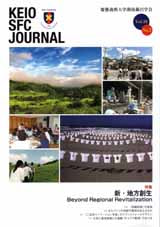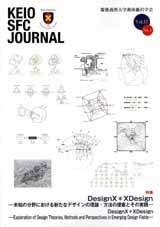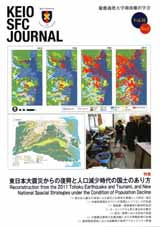- HOME
- KEIO SFC JOURNAL
- Vol.16 No.2

KEIO SFC JOURNAL Vol.16 No.2 Beyond Regional Revitalization
published on 2017.03
SPECIAL FEATURE: Beyond Regional Revitalization
-
Foreword
Download this article (PDF): SFCJ16-2-00.pdfYoshinori Isagai Professor, Faculty of Policy Management, Keio University
-
Reality of "Return to Rural Living"
Tokumi Odagiri Professor, School of Agriculture, Meiji University Interest in rural communities is increasing among urban residents, chiefly those in the younger generation in japan, and not a few people are interested in relocating to rural communities. This large-scale trend is called a "return to rural living." This change in young people's way of thinking is something that we should look at closely. The past 50 years have seen progressive depopulation of rural areas and concentration of population in Tokyo. The realization of a return to rural living suggests a major fork in the road for our society. We need a national conversation on the kind of society we will build in the coming half-century, based on what we have learned in the preceding half-century.
Download this article (PDF): SFCJ16-2-01.pdf -
Supporting the Sustainability of Community Development
Hiroshi Nishimura Director, Workvisions Architects Office Co., Ltd In a depopulating and aging society with changing values, local cities of the whole country are impoverished. For various actions by the government and citizens, when an effect is temporary and is restrictive without spreading around, it is reality that result does not readily appear. Community development must be sustainable. I indicate three points of human resources development, the making of motive, and education by the analysis of the example made with Iwamizawa-city, Saga-city, Kitakata-city.
Download this article (PDF): SFCJ16-2-02.pdf -
Gokinjo Innovation School -A Study for Design of Collaboration Platforms Generating Inner-city Community in "Regional Revitalization" Policy
Kyosuke Sakakura Associate Professor, Faculty of Urban Life Studies, Tokyo City University This paper aims to provide guidelines for designing collaboration platforms generating inner-city community through verification of the effects on "Gokinjo Innovation School" which is the civic involvement project operated by Minato ward office, Tokyo and Keio University. This government-university cooperation project consists of three parts which differ functionally each other : Shiba-no-Ie, Gokinjo Innovation Lab. Shimbashi, Gokinjo Innovator Education Course. These mixed programs generate social networks and local activities required for activation of inner-city community under condition of "Regional Revitalization" Policy. Download this article (PDF): SFCJ16-2-03.pdf
-
Cooperative Career Education between Universities and Regions -The Case of Seijo University and Meiwa-machi, Gunma
Azusa Shomura Doctoral Program, Graduate School of Media and Governance, Keio University To enhance a region's activities, many universities conduct career education programs that involve project-based learning in a particular region. This paper reports about the local revitalization activities conducted by Seijo University and Meiwa-machi. The report reveals that (1) it was easy to gain cooperation from the neighboring small town by concluding a formal agreement with them to have a small class for the university to conduct career education programs for the students of the town; (2) since there were many players in the town and in the university, a key person (student assistant) was appointed to act as a mediator; and (3) to develop the town, the students engaged people in discussions about solving the problems faced by students in small towns, which led to an improvement in the students' career competencies.
Download this article (PDF): SFCJ16-2-04.pdf
-
Adaptability of Chinese Communist Party in the Case of Institutionalization of Labor Dispute Resolution System
Hiroko Naito Senior Researcher, Keio Research Institute at SFC One party system resilience in China is one of the main argument among contemporary Chinese politics scholars. However, the process of how Chinese Communist Party (CCP) adapt to the circumstances for maintaining one party system is rarely examined. The article uses institutionalization of labor dispute resolution system as a case and reveals CCP's adaptability. Analysis reveals following points; (1) CCP tried to put illegal labor dispute into the legal system for social stability, (2) CCP designed the system makes labors difficult to start litigation because litigation has higher possibility to make labor dispute politicize, (3) therefore CCP accelerated the role of arbitration and mediation to save the number of litigation.
Download this article (PDF): SFCJ16-2-05.pdf -
Why Moms Are Not Confident in Their Lives -The Determinants and Considerations
Aya Uemura Doctoral Program, Graduate School of Media and Governance, Keio University This research paper focuses on mothers' self-confidence in Japan, and examines the psychological and social impact factors. Many international studies have testified that young Japanese people show lower self-confidence, self-image, and motivations. However, the solution to build self-confidence is not clear. This paper aims at highlighting mothers' self-confidence as an important family environment for children's well-being, learning and intellectual development. Applying statistics, this paper illuminates factors and implications that affect mothers' self-confidence. The positive prospects of their own future, and the satisfaction with their own current friends' relationship impact on their self-confidence.
Download this article (PDF): SFCJ16-2-06.pdf -
A Systematic Review and Meta-analysis of the Effects of Probiotics on Children with Atopic Dermatitis
Yuri Yamamoto Doctoral Program, Graduate School of Media and Governance, Keio University Daisuke Sugiyama Assistant Professor, Department of Preventive Medicine and Public Health, School of Medicine, Keio University Atopic dermatitis (AD) is a chronic allergy characterized by excessive itching, which has one of the highest morbidities of any dermatological allergy. Recently, the relationship between probiotics and AD has been discussed among physicians. In order to determine the effects of probiotics on AD children, we conducted a meta-analysis based on the changes in SCORAD index. Although the main result suggested that the probiotics group had similar result as the control group, the result from sub-group analysis, divided by age and country region, suggested that AD symptoms in the children (< 6 months) group became worse with the intervention of probiotics. From these results, we conclude that it is difficult to determine whether probiotics are an effective intervention for children with AD.
Download this article (PDF): SFCJ16-2-07.pdf
-
An Analysis Based on Intersubjective Communication in Psychoanalytic Psychotherapy -Toward the Discovery of the 'Preemptive Guilt' in the Context of Japanese Culture
Sachiko Mori Associate Professor, Faculty of Policy and Management, Keio University This paper analyzed the interactions of psychoanalytic psychotherapy between a Japanese client and her Japanese therapist over the issue of 'guilt feelings' from intersubjective perspectives. This led to the discovery of a third kind of guilt, seen as typically Japanese, or 'preemptive guilt,' after two kinds of guilt described by Japanese psychoanalysts, namely, 'guilt feelings as a fear of punishment' and 'guilt feelings following forgiveness.' At a certain time point in the course of this therapy, the therapist was stricken by a sense of guilt and spontaneously apologized to the client. This triggered a move forward in the therapy and uncovered the exact elements of their interactions that had driven the enactment of guilt feelings.
Download this article (PDF): SFCJ16-2-8.pdf -
Millennials Coming to the Neighborhoods -Are They Gentrifiers or Improvers?
Naka Matsumoto Adjunct Instructor, Faculty of Environment and Information Studies, Keio University/Ph.D. Candidate, University of Maryland, College Park This research note reports the ongoing research about effects of generational cohort on neighborhood changes. As millennials, the most diverse and educated generation in history, become adults, their unique characteristics may greatly influence the gentrification process. This note first underlines the needs for the study of this generational effect in the neighborhood. The preliminary findings from a case study in Baltimore, Maryland suggest that millennial gentrifiers are more socially concerned and wish to live in a diverse neighborhood. At the same time their participation in neighborhood activities is not consistent, and the need to incorporate their ideas and actions is discussed herein. Lastly, future research possibilities for developing more collaborative and inclusive neighborhoods are presented.
Download this article (PDF): SFCJ16-2-09.pdf

